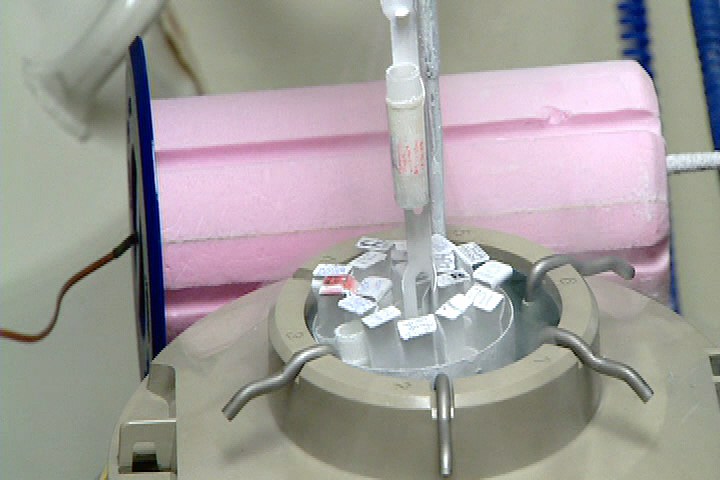BOISE -- It's called gestational surrogacy, or gestational carrying, and it's on the rise in Idaho in a big way. It's when a woman with no biological relation to a human embryo, carries that child to term.
The controversial procedure is often used by parents who struggle with fertility. Parents from all over the world are coming to the Gem State to have children. But those around it, say the practice is often misunderstood, which is why it's even illegal in some other U.S. states.
Danielle Whiteley is the proud mother of four children. She, like a quickly increasing number of other Idaho women, was a gestational surrogate. I love being pregnant, just don't want any more kids. Whiteley carried a baby to term for a couple who had fertility troubles.
April Calhoun, a personal trainer in Boise, was also a gestational surrogate. Like Whiteley, she also had to explain to people exactly what gestational surrogacy is, They just don't know how it works,
How it works, or at least, where it starts is with someone like Tess Shawler of Rocky Mountain Surrogacy. She helps match gestational surrogates with intended parents.
They have list, a wish list basically, said Shawler. We try to find those carriers for them, and then we do conference calls or face-to-face meetings. It's the craziest blind date you've ever had.
She says her business here is growing quickly. She started just a few years ago, and has already helped parents from all over the world, like Australia, Canada, Spain, England, and Germany.
Shawler says there are about 60gestational surrogacy pregnancies in the state every year. While that's not nearly as many as in a state like California,but the number is rising in Idaho. It's a little crazy, said Shawler.
But, what's drawing more and more intended parents to Idaho? First, there's the cost. Shawler says, between her fees, the carrier's compensation, medical costs, and legal fees, a family pays $50,000 to $60,000 to have a baby with gestational surrogacy in Idaho. That sounds like a lot, until you compare it to other states.
Some east coast states charge anywhere from $100,000 to $175,000, said Shawler.
Another reason for Idaho's spike in gestational surrogacy, the laws here allow it. In Washington, it's legal, as long as the carrier isn't paid. It's allowed in Utah, only if the intended parents are married.
So that kind of opens the doors for Idaho, said Shawler.
Meanwhile, in states like Arizona, it's illegal. Shawler says that's because of misconceptions. A lot of people don't understand it, either. Some people consider surrogacy as 'baby selling,' which, it's not at all.
Shawler says a baby selling ring that was busted last year in California gives the practice an undeserved black eye. A formerly respected surrogacy lawyer was sending women to the Ukraine to be impregnated with sperm and embryos from anonymous donors. Prosecutors say she was then selling the unborn children to parents, who thought they were adopting legally by entering into an arrangement with a surrogate mother before the pregnancy.
Some other states have concerns over a mother, impregnated by sperm from a man she's not married to, giving up that child to a couple because of a contract. But, that's more like traditional surrogacy, not gestational surrogacy.
So, genetically, the gestational carrier is not related to the embryo, said Cristin Slater, M.D.Doctor Slater is the Medical Director at the Idaho Center for Reproductive Medicine in Boise. She explains that in gestational surrogacy, a fertilized egg from the intended parents is put into the carrier's uterus. In layman's terms, gestational surrogacy is where the intended parents provide the bun, and the gestational carrier provides the oven.
Dr. Slater says she's seen the number of gestational carriers come through her Center quadruple in the past five years. But, not just anyone can be a carrier.
The carriers have to be screened very thoroughly for their blood work, infectious disease screening, and health maintenance, said Dr. Slater. They have to see a psychologist. They have to see the lawyer. So, it's not something that anyone can do.
But, do the carriers have trouble giving the baby over to the intended parents? They say, they don't have that emotional connection that they had with their own kids. They also say, once you've seen you've made a family whole, you'd do nothing to break that up.
There's nothing that's better than that, said Calhoun. I don't want to get a little choked up, but it's just really cool.
Calhoun said she would love to be a carrier again. While Whiteley will be a carrier again, starting this week. She's in California right now for the procedure.
Whiteley said while the compensation is nice ($18,000 to $30,000), it's not the only reason she's doing this. She said, if she just wanted the money, she's just get a second job because that would be easier than being pregnant.


